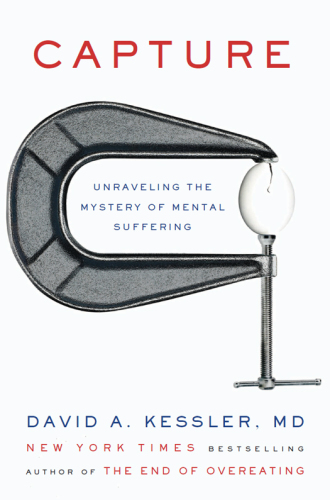
Capture
Unraveling the Mystery of Mental Suffering
فرمت کتاب
ebook
تاریخ انتشار
2016
نویسنده
David A. Kessler, M.D.ناشر
Harper Waveشابک
9780062388537
کتاب های مرتبط
- اطلاعات
- نقد و بررسی
- دیدگاه کاربران
نقد و بررسی

February 29, 2016
In this fascinating book, Kessler (The End of Overeating), former commissioner of the U.S. Food and Drug Administration, probes the nature of the “hijacked” mind, offering a straightforward and plausible explanation of a neural mechanism by which a range of human behaviors can be understood. Drawing on his two decades of research, Kessler calls this underlying mechanism “capture” and reveals its three basic elements: “narrowing of attention, perceived lack of control, and change in affect, or emotional state.” He catalogs the kinds of activities that capture people’s attention—including love, trauma, gambling, and art—and demonstrates that in individual cases these phenomena, or sometimes specific events, can lead from positive mental health to mental illness. Kessler devotes considerable attention to David Foster Wallace as an example of capture turning on the self, with the acute self-awareness that seized Wallace’s attention developing into the self-hatred that led to his suicide. He also carefully points out that capture can lead to violence as well as exalted spiritual experiences. Kessler ends on a note of hope, presenting a range of ways that people can potentially gain more control of their lives through an understanding of capture. This is a hefty yet accessible tome, and Kessler gives readers much to ponder. Agent: Kathy P. Robbins, Robbins Office.

March 15, 2016
Kessler (former commissioner, U.S. Food and Drug Administration; The End of Overeating) writes about the concept of capture, or forces that strongly influence the mind, overriding reason and will. Such a phenomenon looks at afflictions that seem beyond our control; it can be beneficial but more often is harmful. Widely read, Kessler, an attorney and physician, invokes novelists Henry and William James, Freudian drives, and current neuroscience. Examples include writer Franz Kafka and such behaviors as gambling, hypochondria, creative work, suicide, and addiction. According to Kessler, capture motivates, clarifies thoughts, and provides insight. Destructive forms include assassination and school shootings, as well as ideologies--Hitler, Stalinism, Khmer Rouge--that "yoke utopia to violence." Socially approved models include religion and spirituality: captured individuals are often charismatic leaders. Poet William Wordsworth exemplifies aesthetic capture, contrasted with religious--Martin Luther, Buddhism--or political types. Positive forms such as Alcoholics Anonymous oppose destructive ones. A major section of notes and full essays on Ludwig Wittgenstein, Carl Jung, and Paul Tillich amplify the text. VERDICT A challenging and rewarding book for both scholars and lay readers who appreciate well-integrated diversity. [See Prepub Alert, 8/17/15.]--E. James Lieberman, George Washington Univ. Sch. of Medicine, Washington, DC
Copyright 2016 Library Journal, LLC Used with permission.

January 15, 2016
Why do we do things--overeat, obsess, fight, commit suicide--that make it seem like our rational minds have been hijacked by something we cannot control? Everyone deals with this "capture," writes Kessler (The End of Overeating: Taking Control of the Insatiable American Appetite, 2009, etc.), the former Food and Drug Administration commissioner and dean of the medical schools at Yale and the University of California, San Francisco, in a skillful combination of history, medicine, and scientific (but not pop) psychology. Since Aristotle, explanations of behavior relied almost entirely on philosophy. Psychoanalysis did not improve matters, but "by shifting the study of mind away from morality and rationality and toward the unstable ground of desire," writes the author, "Freud moved science toward a clearer understanding of human thought and behavior." Since Freud, scientists have discovered that every stimulus triggers a particular response from a series of brain neurons. Each repetition of that stimulus strengthens the response: "neurons that fire together, wire together." That's how we learn or remember, but it also influences emotions. The sight of someone we love or a work of art triggers intense feelings, but what happens when feelings about a drug, a stranger's glare, or one's defects become irresistible? After nearly 50 pages of argument, Kessler devotes 150 pages to the dismal impact of capture over the years: autobiographies of individuals driven to lives of torment (Dostoyevsky) that often ended in suicide (Ernest Hemingway, Sylvia Plath, Virginia Woolf, David Foster Wallace), addiction (John Belushi, Tennessee Williams), assassination (John Lennon, Robert Kennedy), or mass murder. In the final 50 pages, the author reveals the concept of capture in a positive light through those who have fended off depression (Winston Churchill, William Styron) or channeled intense feelings into religion, work, or creativity. A reasonable theory of the science behind extreme behavior illustrated by excessive but gripping case histories.
COPYRIGHT(2016) Kirkus Reviews, ALL RIGHTS RESERVED.

























دیدگاه کاربران